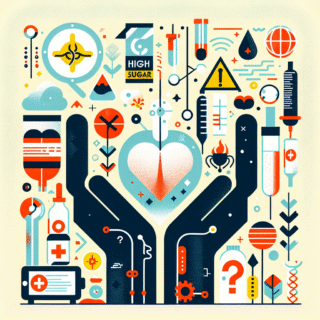
More Heart Disease, Stroke and Diabetes Articles
Can High Sugar Cause Nausea?

Many people have experienced a queasy feeling after eating a lot of sweets or drinking sugary beverages — sometimes called sugar nausea — but the reasons behind that discomfort are varied. Nausea can follow a large sugar load or be related to underlying problems with how your body manages blood glucose. Understanding the possible causes helps you decide when simple dietary adjustments are enough and when to seek medical care.
What is sugar-related nausea?
Sugar-related nausea is a lay description for feeling sick after consuming high amounts of sugar. It can result from rapid shifts in blood glucose, stimulation of the gut by concentrated carbohydrates, or longer-term complications of diabetes that affect digestion. While an occasional upset stomach after a dessert is often harmless, persistent or severe nausea linked to sweet foods may signal a metabolic or gastrointestinal issue.
How high sugar affects the body and why nausea can occur
When you eat a lot of simple carbohydrates, blood glucose can spike quickly. That rapid rise prompts a strong insulin response; in some people this is followed by a sharp drop in blood sugar (reactive hypoglycemia), which may cause sweating, weakness, dizziness and nausea. Questions like can high sugar cause nausea or does high sugar cause nausea arise because both extremes — very high and very low blood sugar — can trigger queasiness.
On the other hand, consistently elevated levels of blood glucose (hyperglycemia) can also lead to nausea. For example, gastroparesis — delayed stomach emptying often seen in long-standing diabetes — may make you feel full, bloated, and nauseated after meals. In severe hyperglycemia or diabetic ketoacidosis, nausea and vomiting are common warning signs. If you want a deeper medical overview of high blood sugar, see this hyperglycemia overview (Wikipedia).
Common scenarios: when could high blood sugar cause nausea?
- After a large sugary meal or drink: Osmotic load in the gut and rapid glucose swings can provoke nausea.
- Reactive hypoglycemia: A large insulin release after a sugar spike can cause blood sugar to fall and produce nausea among other symptoms.
- Chronic uncontrolled diabetes: Could high blood sugar cause nausea through complications such as gastroparesis or metabolic disturbances.
- Alcohol mixed with sweets: Alcohol affects gastric emptying and blood sugar regulation, increasing the chance of nausea.
When blood sugar and nausea are a medical concern
Does high blood sugar cause nausea that requires urgent care? If nausea is accompanied by excessive thirst, frequent urination, fruity breath, abdominal pain, rapid breathing, or confusion, seek immediate medical attention — these can be signs of diabetic ketoacidosis or severe hyperglycemia. If you have known diabetes and notice regular post-meal nausea or symptoms suggesting gastroparesis (bloating, early fullness, vomiting), discuss testing and treatment with your clinician.
Simple steps often reduce sugar-related nausea: eat balanced meals with protein and fiber to slow absorption, avoid very large portions of simple sugars, stay hydrated, and pace alcohol intake. For people with diabetes, careful monitoring of blood glucose and working with a care team to optimize medication, meal timing, and portion size are key. Managing cardiovascular risk alongside metabolic health is also important; for practical advice about protecting heart and metabolic health, see this resource on heart disease and diabetes: Love Your Heart: heart disease, stroke and diabetes.
Practical tips and when to see a doctor
- Track patterns: Note what you ate and how you felt to identify triggers.
- Balance your plate: Combine carbohydrates with proteins, healthy fats, and fiber to reduce glucose spikes.
- Monitor symptoms: Seek care for persistent vomiting, dehydration, or if you have diabetes and experience high or low readings with nausea.
- Medication review: Some medicines and supplements can affect blood sugar or digestion; review them with your provider.
- Takeaways
- Sugar can trigger nausea through rapid blood sugar swings or by worsening chronic conditions like gastroparesis.
- Both very high and very low blood sugar may cause queasiness; monitor and address persistent patterns.
- Balanced meals, hydration, and medical review are effective first steps to reduce sugar-related nausea.
Q: Can high blood sugar cause nausea on its own?
A: Yes. Persistent hyperglycemia can lead to metabolic disturbances and gastrointestinal complications (like gastroparesis) that produce nausea. In acute severe cases such as diabetic ketoacidosis, nausea and vomiting are common and require urgent care.
Q: If I feel sick after sweets, does it mean I have diabetes?
A: Not necessarily. Occasional nausea after overeating sugar can result from rapid glucose shifts or stomach irritation. However, if symptoms are repeated, accompanied by excessive thirst, frequent urination, unexplained weight loss, or abnormal glucose readings, see a healthcare provider for evaluation.
Q: How can I prevent sugar-induced nausea?
A: Preventive steps include eating smaller portions of simple sugars, pairing carbs with protein and fiber, staying hydrated, and monitoring blood sugar if you have diabetes. If lifestyle changes don’t help, consult a clinician for further testing and treatment options.
Other Articles You May Find of Interest...
- Can High Sugar Cause Nausea?
- Bad EKG Results: Results, Ranges, and What They Mean
- Whats Abnormal ECG?
- Can Diabetes Cause Nausea?
- What Abnormal EKG Means?
- Understanding Sudden Cardiac Arrest: A Silent Emergency That Demands Immediate Action
- Expert Heart Care in Singapore: Finding the Right Heart Doctor for Your Needs














